
On July 11, there was a historic phone call between Armenian Prime Minister Nikol Pashinyan and Turkish President Recip Tayyip Erdogan. “Pashinyan greeted President Erdoğan on the occasion of Eid al-Adha, while the Turkish president congratulated the Armenian prime minister on the upcoming Vardavar Festival,” as described by Hurriyet Daily News.
Civilnet called it “…a breakthrough moment for Armenia-Turkey relations. It is the first direct conversation between the leaders of the two countries in many years.” Per Hurriyet Daily News, “The two leaders emphasized the importance they attach to the bilateral normalization process between Türkiye and Armenia, which will also contribute to the strengthening of peace and stability in the region, said the presidential communications directorate.”
It appears that normalization and an opening of the borders, which have been closed since 1993, is in the works. To us in the diaspora and as faithful readers of this paper, Armenia seems to be doing all the compromising, all the giving in, and ceding territories to achieve this normalization and opening of the borders. There is a real fear on the long-term prospects of all of this.
Many of us are quick to blame Pashinyan. He lost that horrible war. Many of us feel he is giving away Armenian lands. For what? What are we getting out of this? Living in a world where Turkey and Azerbaijan have control of the future of the region. Will they continue to chip away at what is left of Artsakh? Armenia itself? Will the open border be a boon for the country, or will Armenia just be overrun with Turkish goods, Turkish interests and Turks? Will Armenians stay and even repatriate, or will the population continue to erode? These questions weigh on our hearts and souls. Being Armenian and given what has happened to us in the past hundred years, we worry, and sadly believe, the worst possibilities are the most probable.
When Pashinyan was elected, many of us believed the people had finally risen up and spoken. There was hope that we had broken away from having self-serving corrupt leaders with one leg still in the SSR. Sure, he didn’t have experience, but he was fresh and an advocate for the country and people. He even stood up to Putin.
In hindsight, I believe Pashinyan was naïve and inexperienced. Putin and Erdogan manipulated him and Armenia. Leading up to the war, there were all kinds of border incursions with no definitive protests from any country but Armenia. All the while, Turkey and Azerbaijan were planning for a war in which they were certain no one would lift a finger to help Armenia and Artsakh. With Turkish and Israeli drones, Turkish command and control, Turkish-supplied mercenaries and Russian complicity in the form of silence, the war began and the valiant but underequipped Armenians were eventually overrun. Russia stepped in when, in my opinion, an agreed upon line was reached and imposed a ceasefire that was most likely already agreed upon by Erdogan and Putin.
It was during the war when people first started calling on Pashinyan to resign. In my view, one of three things was true: he was a deer in the headlights, an incompetent war time leader, or told in no uncertain terms if Armenia intervened beyond a certain limit, Armenia itself would also be invaded. It was probably a combination of being manipulated and being incompetent. By the time of the ceasefire statement, it was clear no one was coming to Armenia and Artsakh’s aid. Both countries could be overrun, and there was simply no room for negotiation. The agreement was imposed upon us.
Our collective hearts were heavy as we dreaded the details of implementing the terms of agreements of any “truce.” We all realized there was very little negotiation room. As Armenia’s current prime minister, Pashinyan is certainly to blame – as are his predecessors. They share blame. What did they do, or rather not do, to prepare for the inevitable next war with Azerbaijan? What did they do, or again not do, to make Artsakh part of Armenia? They had 28 years to prepare for this and clearly did not do enough. The opposition to Pashinyan reportedly has been led by former President Robert Kocharyan. He led the Nagorno-Karabakh Republic from 1994 to 1997. He then led the Republic of Armenia for another 11 years. Why did he not unite the two countries and bolster the defense forces? The same could be said for Serzh Sargsyan. We simply have never learned the lesson of the paper versus iron ladle of Khrimian Hayrig nor have we heeded the message in Yeghishe Charents’ famous acrostic in his poem, Precept: “Oh Armenian people, your one and only salvation is concealed in your collective strength.”
What lies in our future?
Will there be real peace with Turkey and Armenia? Will it be the kind of peace that will allow our natural ingenuity to flourish? Or will it be the kind of “peace” that allows oligarchs from Turkey, Azerbaijan, Russia and, maybe, Armenia to grow richer? Will it be a peace that fixes our borders and a peace that our neighbors honor? Or will it be a peace where Turkish trade, investors and people overwhelm Armenia and…? I cannot even fathom this scenario.
One thing that is crystal clear is that since losing the 2020 war: Armenia has had zero negotiating power. Another lesson is that the fate of Armenia is more in the hands of the Republic of Armenia than the Armenians in the Diaspora. If we in the Diaspora want to make a difference, we have to be there, and even with that there are no guarantees.
It is not clear where our nation is headed, but at least Erdogan congratulated us as we are about to celebrate Vardavar.


Be the first to comment